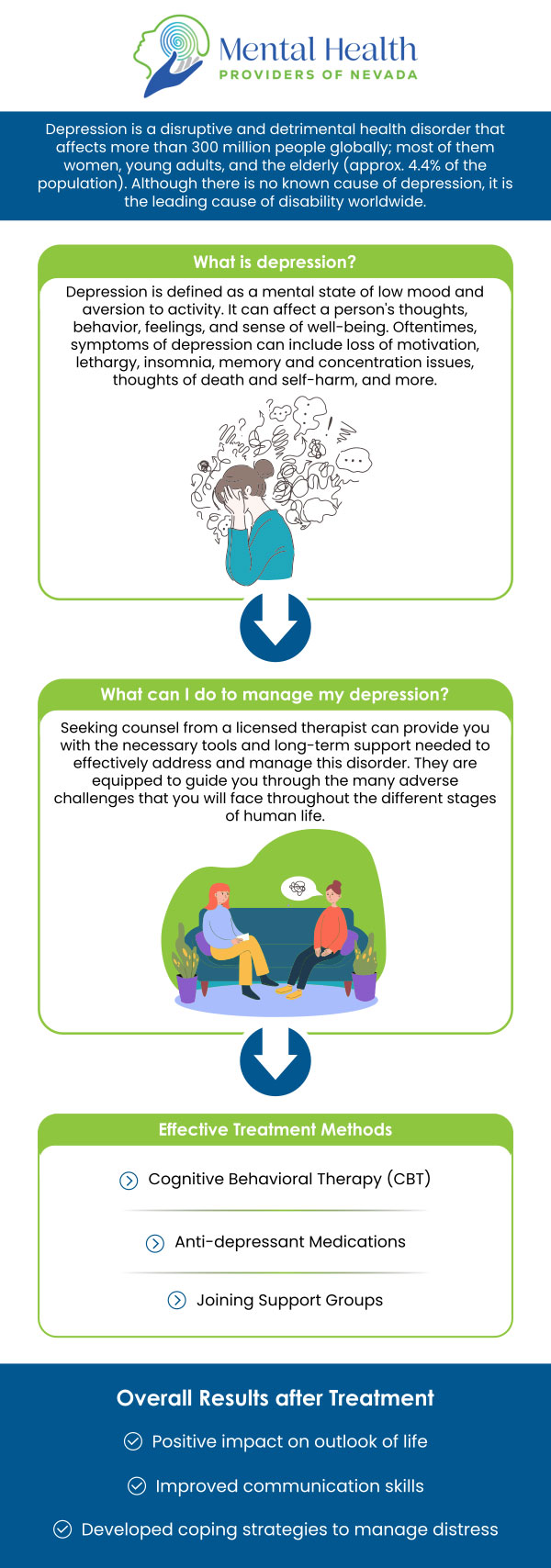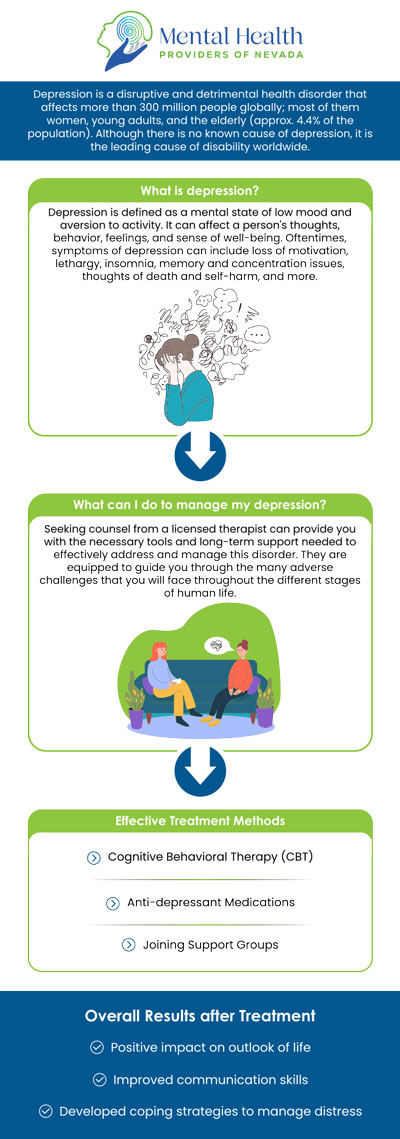Depression in Men and Women: What You Should Know
Depression can affect both men and women, but its symptoms may differ. Men often experience irritability, anger, and fatigue, while women may show signs of sadness, guilt, and emotional numbness. Both genders can face changes in appetite, sleep disturbances, and difficulty concentrating. Consult Deborah, NP, PhD, to ensure that depression is properly addressed with the appropriate care. For more information, contact us or request an appointment online. We are conveniently located at 2620 Regatta Drive, Suite 246A, Las Vegas, NV 89128.


Table of Contents:
How does depression affect men differently than women?
What are the unique signs of depression in men?
How can depression in women impact hormonal health?
What are the common triggers of depression in men?
Depression impacts both men and women significantly; however, it often manifests and presents differently depending on gender. Understanding these differences is essential to providing personalized, effective mental health care.
For instance, men experiencing depression may be less likely to recognize or admit their symptoms due to societal expectations around masculinity and emotional resilience. Rather than openly expressing sadness or emotional distress, men might demonstrate irritability, anger, or hostility. These behaviors can often mask underlying depression, making it harder for individuals and their loved ones to recognize and seek help.
Men struggling with depression may also engage in risky or self-destructive behaviors, such as substance abuse, excessive drinking, reckless driving, or other harmful activities. Unfortunately, these patterns might be misunderstood as personality traits or temporary coping mechanisms rather than symptoms of an underlying mental health issue. Additionally, men with depression may frequently experience physical symptoms including headaches, digestive issues, or chronic pain, which further complicate diagnosis and treatment.
In contrast, women experiencing depression typically exhibit more overt symptoms, such as feelings of sadness, emotional vulnerability, anxiety, and guilt. Women tend to be more proactive in reporting their emotional state and often seek help from healthcare professionals or support networks. Hormonal and biological factors during specific life stages such as pregnancy, postpartum, and menopause can also influence depression’s prevalence and presentation among women.
Because depression often goes undiagnosed or undertreated in men, they may face higher risks of serious complications, including social isolation, strained relationships, and increased vulnerability to suicide. At Mental Health Providers of Nevada, we emphasize the importance of early identification and tailored intervention strategies for men and women alike. If you or someone you care about is experiencing symptoms of depression, our compassionate professionals are here to provide comprehensive care and support.
Men dealing with depression often display increased irritability, anger, or aggressive behaviors rather than the commonly recognized symptoms of sadness or isolation. They might engage in reckless or risky behaviors, including excessive drinking, substance misuse, gambling, or dangerous driving, as a way of managing their emotional distress.
Physical symptoms such as chronic headaches, digestive issues, back pain, and unexplained fatigue are also common among men experiencing depression. Additionally, some men may find themselves overworking or obsessively focusing on their careers or hobbies as a means of escaping negative emotions. Social isolation from family and friends or, conversely, becoming overly controlling or demanding in relationships, are other indicators that a man may be dealing with depression.
Men coping with depression may also experience decreased libido or sexual dysfunction, which can intensify feelings of inadequacy or frustration. Sleep disturbances, including insomnia or excessive sleeping, are also frequently reported symptoms.
At Mental Health Providers of Nevada, we recognize the societal pressures that may discourage men from openly discussing their emotional struggles or seeking professional help. Our dedicated team of mental health specialists provides a welcoming, judgment-free environment where men are encouraged to openly discuss their symptoms, receive compassionate support, and access effective, personalized treatment options.
Mental Health Providers of Nevada recognizes the profound connection between mental health and hormonal balance, particularly in women experiencing depression. Depression in women can significantly disrupt hormonal health, affecting multiple bodily systems and overall well-being. One of the primary ways depression influences hormonal balance is through its impact on the hypothalamic-pituitary-adrenal (HPA) axis. Persistent depressive symptoms often trigger chronic stress responses, resulting in elevated cortisol levels. This increase in stress hormones can interfere with the normal functioning of reproductive hormones such as estrogen and progesterone, essential for women’s overall health.
When hormonal balance becomes disrupted, women may experience irregular menstrual cycles, changes in libido, and fertility challenges. Furthermore, depression can impair thyroid hormone regulation, potentially leading to symptoms such as fatigue, weight fluctuations, and mood instability. Our clinical experts are committed to identifying and addressing the root causes of these hormonal disruptions, providing personalized care plans designed to break the cycle between depression and hormonal imbalance.
Hormonal disruptions caused by depression also influence the onset or severity of menopausal symptoms. Women experiencing depression during perimenopause or menopause often report intensified hot flashes, sleep disturbances, and mood swings due to fluctuations in estrogen and progesterone. Our providers are skilled in supporting women throughout these life transitions by offering effective treatments, counseling, and coping strategies to manage symptoms and improve quality of life.
Depression in men can arise from diverse factors, often involving multiple overlapping triggers. Commonly, challenging life events such as relationship breakdowns, divorce, or the loss of a loved one can prompt depressive episodes. Financial pressures, unemployment, or workplace difficulties significantly impact men’s mental well-being, potentially leading to feelings of inadequacy, anxiety, or hopelessness.
In addition, physical illnesses or chronic health conditions, especially those causing ongoing pain or reduced independence, can trigger or intensify depression. Substance abuse, including excessive alcohol consumption or reliance on other substances, frequently contributes to and worsens depressive symptoms, complicating recovery.
We also recognize the role of social isolation, loneliness, and difficulty in expressing emotions or seeking help, which can heighten men’s vulnerability to depression. Unaddressed past trauma, childhood adversity, and persistent stressors like caregiving responsibilities play significant roles in increasing the risk of depressive episodes.
As men age, hormonal changes and declining physical capabilities may impact their self-esteem and emotional well-being, contributing further to depressive symptoms. Unfortunately, societal expectations around masculinity and emotional strength often make it challenging for men to acknowledge or seek help for depression, delaying critical diagnosis and treatment.
Our compassionate team at Mental Health Providers of Nevada is dedicated to providing judgment-free support and proactive mental health care tailored to men’s unique needs. By recognizing these common triggers and signs of depression early, we aim to encourage men in our community to seek timely support, find effective treatment solutions, and achieve improved mental health and overall well-being.
Visit Mental Health Providers of Nevada for tailored treatment of depression and support. For more information, contact us or request an appointment online. We are conveniently located at 2620 Regatta Drive, Suite 246A, Las Vegas, NV 89128. We serve patients from Las Vegas NV, Winchester NV, Sunrise Manor NV, Spring Valley NV, Whitney NV, Paradise NV, and surrounding areas.

Additional Services You May Need
▸ Telehealth
▸ Bipolar Disorder
▸ Insomnia
▸ Psychosis
▸ Medication Management
▸ Anxiety Disorder
▸ Post Traumatic Stress Disorder
▸ Obsessive Compulsive Disorder (OCD)
▸ Oral Ketamine
▸ Depression
▸ Talk Therapy

Additional Services You May Need
▸ Telehealth
▸ Bipolar Disorder
▸ Insomnia
▸ Psychosis
▸ Medication Management
▸ Anxiety Disorder
▸ Post Traumatic Stress Disorder
▸ Obsessive Compulsive Disorder (OCD)
▸ Oral Ketamine
▸ Depression
▸ Talk Therapy




